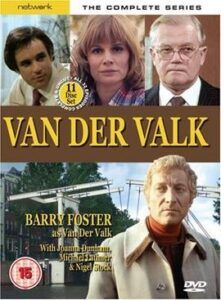A Golden Era: Classic American TV Detectives of the 1970s
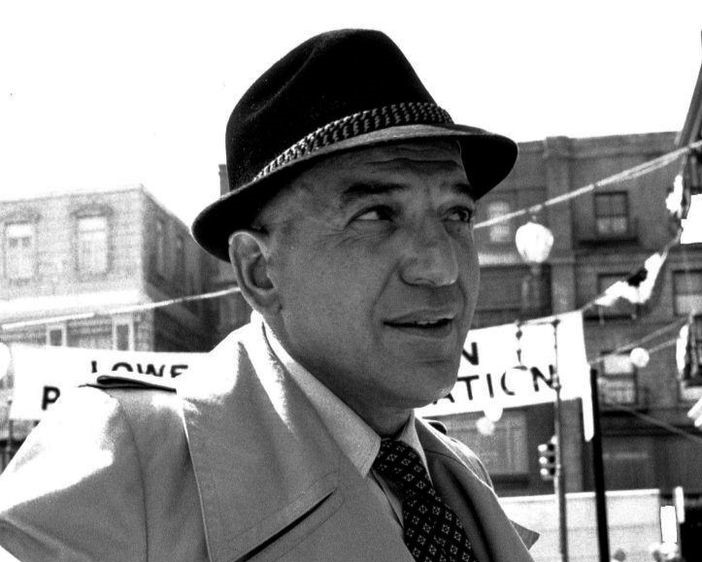
Telly Savalas as Kojak in 1973
The 1970s marked a significant period for American television, especially in the world of detective dramas. As societal changes swept through the United States, the portrayal of crime and justice on TV mirrored the shifting landscape. The detective dramas of the 1970s were more than mere “whodunits”; they offered an insight into a complex, morally ambiguous world, where law enforcers were flawed but determined. American TV Detectives of the 1970s became cultural icons, their unique personalities and investigative methods cementing them in the pantheon of television history.
Let’s take a look back at some of the classic American TV detectives of the 1970s, exploring their legacy and why they continue to capture the imagination of audiences today.
The Changing Face of Crime Drama
The 1970s in the United States was a turbulent time, socially and politically. The post-Vietnam era, the Watergate scandal, and growing distrust in authority all played into the changing tone of television, which moved towards more realism and moral complexity. The detective shows of the time reflected these shifts, moving away from the simple, formulaic approach of earlier years to something more nuanced and gritty.
Unlike the earlier days when detectives were often portrayed as infallible heroes, the 1970s brought forth flawed, complex protagonists who operated in a world that wasn’t simply black and white. These detectives didn’t always play by the rules, and their methods were sometimes unorthodox, but they always had a strong moral compass driving them to uncover the truth.
Iconic American TV Detectives of the 1970s
- Lt. Columbo – The Inimitable Columbo
One of the most enduring detectives of the 1970s was Columbo, portrayed by Peter Falk. Columbo debuted in 1968 but ran well into the 1970s and beyond, becoming one of the most beloved detective shows of all time. Unlike many of his contemporaries, Lt. Columbo didn’t carry a gun or engage in physical confrontations. Instead, he relied on his sharp mind and disarming manner to solve crimes.What made Columbo unique was the show’s format: audiences often saw the crime committed at the beginning of the episode, making it less about ‘whodunit’ and more about ‘how will Columbo catch them’. His rumpled raincoat, messy hair, and seemingly absent-minded demeanour fooled many a suspect into underestimating him, but beneath his unassuming exterior was a brilliant detective. Columbo’s catchphrase, “Just one more thing…”, became iconic, signalling that the detective was about to trap the perpetrator with one final piece of evidence.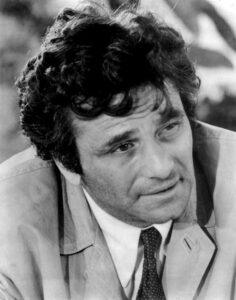
Peter Falk as Columbo in 1973. The show’s success lay not only in Falk’s superb performance but also in its sharp writing and unique take on the detective genre, offering a more intellectual approach to crime-solving.
- Kojak – The Tough but Charismatic Detective
While Columbo relied on his wits and guile, Kojak introduced a very different kind of TV detective. Played by the inimitable Telly Savalas, Lt. Theo Kojak was a bald, lollipop-sucking detective who patrolled the streets of New York City. The show aired from 1973 to 1978 and quickly became a massive hit.Kojak was tough, charismatic, and willing to bend the rules if it meant getting justice. Yet beneath his no-nonsense exterior was a deeply compassionate man who genuinely cared about the victims of the crimes he investigated. His catchphrase, “Who loves ya, baby?”, became synonymous with the show and was often used to soften his gruff persona.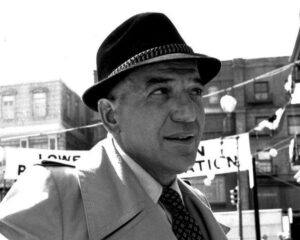
Telly Savalas as Kojak in 1973. Kojak epitomised the urban, gritty crime drama of the 1970s, showcasing a city riddled with corruption, violence, and inequality. Kojak’s determination to root out crime, no matter how powerful the perpetrators, resonated with audiences at a time when distrust of authority was high. The show’s balance of action, tension, and moral complexity made it a standout of the decade.
- Jim Rockford – The Reluctant Hero in The Rockford Files
The Rockford Files, which aired from 1974 to 1980, introduced audiences to Jim Rockford, a private investigator with a laid-back, almost reluctant approach to crime-solving. Played by James Garner, Rockford was far from the typical hard-boiled detective. He preferred fishing to chasing down criminals and often took on cases with little reward, both financially and personally.What set The Rockford Files apart from other detective shows was its character-driven storytelling and Rockford’s down-to-earth nature. He lived in a mobile home, avoided violence whenever possible, and used his quick wit and charm to navigate tricky situations. Rockford’s world was full of small-time crooks, hustlers, and ordinary people caught up in bad situations, and his cases were often less glamorous than those of other TV detectives.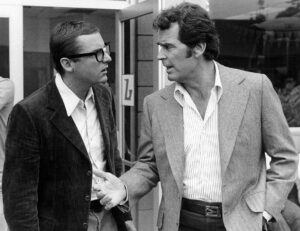
James Garner (right) as Jim Rockford. Despite his reluctance to get involved, Rockford had a strong moral compass and a genuine desire to help people. The show’s blend of humour, sharp dialogue, and engaging mysteries made it a classic of the era.
- Starsky & Hutch – The Action-Packed Duo
If The Rockford Files provided a more low-key, character-driven approach to detective work, Starsky & Hutch delivered action-packed thrills. The show aired from 1975 to 1979 and followed two detectives, David Starsky (played by Paul Michael Glaser) and Kenneth “Hutch” Hutchinson (played by David Soul), as they tackled crime in a fictional Californian city.The dynamic between the two leads was one of the show’s greatest strengths. Starsky was the street-smart, impulsive detective, while Hutch was more cerebral and methodical. Together, they formed a complementary partnership that made for exciting television. The show was known for its high-octane car chases, intense shootouts, and dramatic storylines, as well as its iconic red Ford Torino with a white stripe.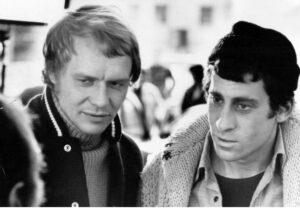
Hutch on the left, Starsky to the right. Starsky & Hutch reflected the rise of buddy cop dramas, combining camaraderie, action, and a sense of justice in a world where crime seemed to be everywhere. The duo’s willingness to bend the rules in their pursuit of justice, along with their distinctive personalities, made them beloved figures of 1970s television.
- Baretta – The Streetwise Cop with a Heart
Another detective who made his mark on 1970s American television was Baretta, portrayed by Robert Blake. The show aired from 1975 to 1978 and followed the exploits of Tony Baretta, a tough, streetwise undercover detective with a strong sense of justice. Baretta’s unorthodox methods and his ability to blend into the criminal underworld made him an effective investigator, but his compassion for the victims of crime gave the show a sense of heart.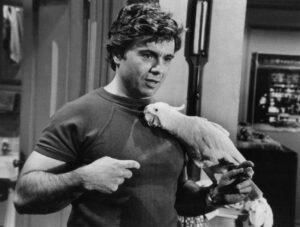
Robert Blake and Fred, 1976. Baretta’s parrot, Fred, and his catchphrase, “Don’t do the crime if you can’t do the time”, became signature elements of the show. Much like Kojak, Baretta was a man willing to push the boundaries of legality if it meant achieving the greater good, a theme that resonated in a decade where the public’s faith in institutions was waning.
The Enduring Legacy of 1970s American TV Detectives
The American TV detectives of the 1970s remain some of the most iconic characters in television history. They not only entertained audiences with their thrilling adventures but also reflected the complex, often morally ambiguous nature of the world they inhabited. In an era marked by social and political change, these detectives stood as symbols of justice, resilience, and the unrelenting pursuit of truth.
What made these shows endure wasn’t just their action-packed plots or clever mysteries but the depth of their characters. Whether it was Columbo’s understated brilliance, Kojak’s gritty determination, or Rockford’s everyman charm, these detectives became more than just heroes – they became representations of a society grappling with change, uncertainty, and the quest for justice.
Their legacy continues to influence modern detective shows, proving that the classic American TV detectives of the 1970s remain as relevant and beloved as ever. Of course any fan of this era will know this is a lightweight list. Part two will follow with many more names from the avenues and alleyways of memory.
Thanks
Shaun
